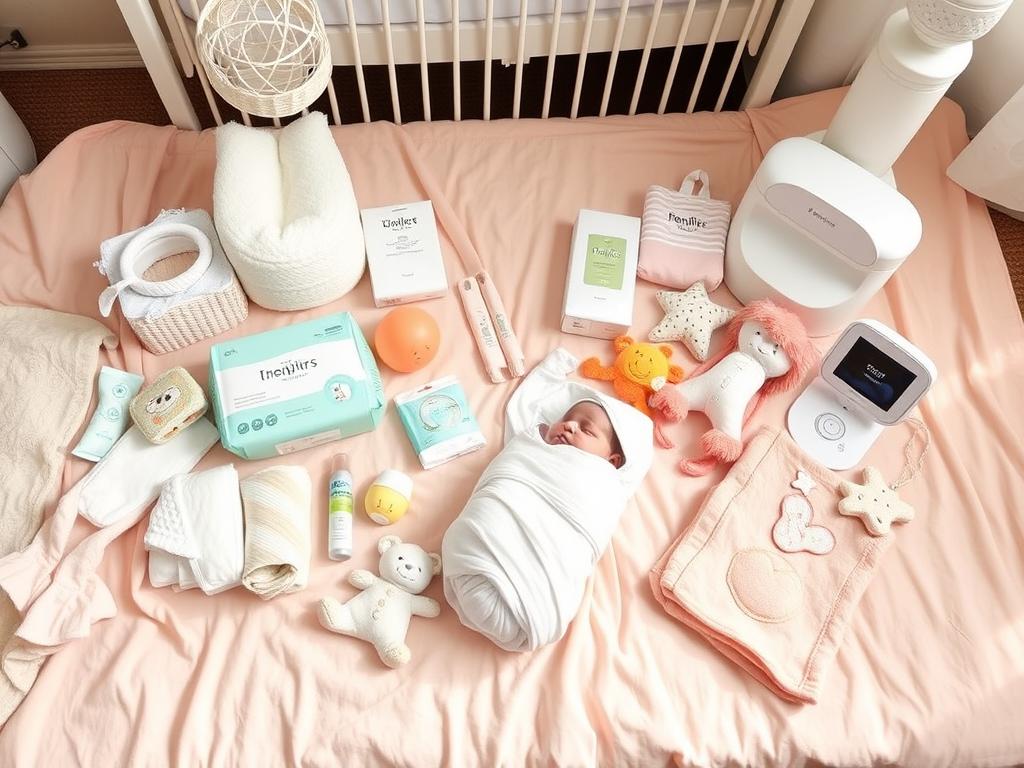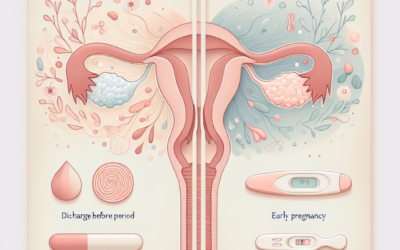Being new parents is a big change and brings many special moments. The first few weeks are about getting used to each other. Your baby will sleep a lot, about 16 hours, but only for a short time now and then. You will find yourself changing diapers and feeding a lot. This will become your everyday life. But, learning how to take care of your baby gets easier with helpful tips. Knowing how to breastfeed well or making a good sleeping space can help a lot. Every small step, like changing diapers, helps create a happy family.
Key Takeaways
- Acquaint yourself with a newborn’s sleep schedule which typically involves up to 17 hours of sleep over numerous short periods throughout the day.
- Anticipate the frequency of feedings and diaper changes, which can serve as indicators of your baby’s well-being.
- Stay vigilant for any signs of jaundice and consult with your pediatrician if you notice a yellowish tint to your baby’s skin.
- Seek lactation support early on to navigate the intricacies of breastfeeding and consider timing when introducing a bottle.
- Connect with social networks such as family, friends, and new parents groups to build your support system and ease the transition into parenthood.
- Prioritize skin-to-skin contact, which benefits both the newborn and parents, reducing stress and fostering emotional connection.
- Remain adaptable and open to the dynamic nature of newborn care, recognizing that your baby’s needs will evolve daily.
Navigating the First Night at Home: A Parent’s Guide
Bringing your newborn home is an exciting but anxious time. Being ready can calm your nerves and keep your baby safe all night. Follow these steps for a smooth first night, keeping your baby’s milestones and safety in mind.
Essential Tips for Baby’s First Car Trip
The journey starts with the drive home. It’s vital to keep your baby safe. Use a rear-facing car seat, installed as the maker says. At Mommy Did You Know, you’ll find tips for a safe ride. Dress your baby right and adjust for the weather to avoid overheating. Put extra layers over the car seat straps, not under, to keep them snug.
Preparing Your Home for Safe Newborn Sleep
Once home, ready a safe sleeping spot. The American Academy of Pediatrics recommends a firm, flat sleep area in a crib. No soft bedding, pillows, or toys. This reduces Sudden Infant Death Syndrome (SIDS) risks. Always watch for signs of breathing issues or odd skin colors.

| Task | Details | Tips |
|---|---|---|
| Feeding | Every 2-3 hours | Look for hunger signs; feed on time, either breast or bottle. |
| Diaper Changes | Approx. 8-10 times a day | Protect skin with a soft barrier like Vaseline. |
| Sleep Monitoring | 16-18 hours a day | Keep baby on their back, check if they’re too hot or cold. |
| Wellbeing Check | Constant during awake periods | Notice any distress or discomfort. Watch for color changes or unusual cries for a possible first pediatric visit. |
The first moments are about you and your baby getting used to each other. By following these tips, you help meet your baby’s safety and health milestones. This is a great start to your journey together.
Mastering the Art of Breastfeeding and Supplemental Feeding
Starting your breastfeeding journey, it’s vital to grasp its complexities. These include proper latching and handling soreness. These steps greatly improve your experience and secure strong newborn nutrition. Studies show that 80% of moms face painful nursing because of bad latch. This leads to issues like cracked nipples found in 45% of breastfeeding mothers. By finding the right nursing positions and using support pillows, you can solve these problems and make breastfeeding effective.
When it’s time for supplemental feeding, start it after exclusively breastfeeding for about 6 to 8 weeks. This strategy helps you keep up with breastfeeding while meeting your baby’s growing food needs. Correctly adding a bottle can ease your routine without hurting your efforts to breastfeed.

Getting lactation support is crucial, as shown by the 85% of moms who found it helpful. Advice from lactation experts or support groups can fix issues like poor latching. It also boosts your confidence through knowledge and emotional support, improving your journey.
To better support your breastfeeding, use nipple therapy creams like Lanolin, as 60% of mothers recommend. Also, tools like nipple guards and heating pads help with comfort and healing. This ensures you can continue breastfeeding successfully.
| Issue | % of Mothers Affected | Effective Solutions |
|---|---|---|
| Bad Latch | 80% | Consultation, Proper Nursing Positions |
| Cracked Nipples | 45% | Lanolin Cream, Nipple Guard |
| Fussiness during Feed | 70% | Responsive Feeding Techniques |
| Using Nipple Therapy | 40% | Breast Heating/Cooling Pads |
Newborn nutrition and breastfeeding success are closely linked to overcoming these obstacles. You can find helpful advice from sources like the Academy of Breastfeeding Medicine. They suggest watching newborns’ weight loss to make smart supplemental feeding choices. This ensures your baby gets a great start.
Understanding Newborn Sleep Patterns and Tips for Rest
New parents, welcome to the complex world of newborn sleep. It’s crucial to understand sleep patterns and use good strategies. This can help your whole family’s well-being. You’ll find ways to manage sleep better, which is good for parental mental health and cuts down on sleep loss.
The Importance of Sleep for Parental Mental Health
Sleep is super important for parents’ mental health. Not getting enough sleep can make you stressed and more. It’s key to balance your sleep with your newborn’s sleep needs. This balance helps you feel better every day and keep good mental health.
Coping with Sleep Deprivation: Strategies for New Parents
To handle sleep loss, try some coping strategies. You could share nighttime baby care with your partner. Sleep when your baby sleeps. Also, make a regular bedtime routine that helps your baby know night from day. Knowing how newborns typically sleep can set your sleep expectations right.
Below, check out a table for insight into baby sleep at different early stages. It helps plan your routines and expectations.
| Age | Total Sleep | Daytime Sleep | Nighttime Sleep | Remarks |
|---|---|---|---|---|
| 1-4 weeks old | 15-18 hours | 8-9 hours | 8 hours | Sleeps in short bursts, adjusting to life outside the womb. |
| 1-4 months old | 14-15 hours | 4-5 hours | 9-10 hours | Begins to develop night and day sleep patterns. |
| 5-11 months old | 12-14 hours | 3-4 hours | 9-10 hours | May begin sleeping through the night without feeding. |
As you move through these stages, use day activities to keep baby awake and night actions to calm. Being consistent is crucial for good newborn sleep habits. This helps the family. Strategies like swaddling or setting a bedtime routine can make a big difference in sleep quality.
Putting these practices together with understanding sleep patterns helps a lot. It betters newborn sleep and parental health. This cuts down sleep deprivation’s effects and improves your coping skills.
Developing a Soothing Routine and Managing Fussy Periods
Being a new parent means learning how to deal with newborn ups and downs. It’s very important to establish a calming routine for your baby’s happiness. Babies can be fussy for 45 minutes to 2 hours daily in the first six months. Colic is most common between six and eight weeks, but remember, babies under six months can’t be spoiled. It’s important to respond to their needs for comfort and care.
Mimicking the Womb: Techniques to Calm Your Newborn
Calming a newborn is often about making them feel like they’re back in the womb. Wrapping your baby snugly in cloth can make them feel secure and calm. Making soft “shh” sounds can remind them of the noise they heard inside the womb. Also, gently rocking or swinging your baby helps soothe them to relaxation. As babies learn to calm themselves, crying reduces. Keeping up with comfort methods can help this along.
The Role of Newborn-Safe Products in Soothing
Newborn products are also big in making your infant feel comforted. Using warm wipes and baths can make for a cozy experience, which helps with colic symptoms seen in one out of five babies. It’s important to choose products made safe for newborns. Whether it’s the right kind of diapers – you’ll need a lot, or a gentle baby rocker, each plays a big role. They all help create a peaceful space for a happy and growing baby.
FAQ
What should be included in newborn care for new parents?
For new parents, baby care basics include knowing how your baby eats and sleeps. You also need to keep everything clean, especially the belly button area. Safety during sleep is important to avoid SIDs. Parents should go to all baby doctor visits and get the baby vaccinated. Being patient and getting help when needed is key to this journey.
How can I prepare for my newborn’s first pediatric visit?
For this visit, track when your baby eats, sleeps, and their diaper changes. List any questions or worries to talk about with the doctor. Plan to get there on time with your baby’s vaccine card and insurance information.
What are some essential tips for my baby’s first car trip?
Use a rear-facing car seat that’s installed right. Dress the baby right for the weather. Don’t put too many clothes under the car seat straps. Drive gently to make the trip calm. Always keep an eye on your baby to keep them safe.
How should I prepare my home for safe newborn sleep?
Make a safe sleep space with a firm mattress and no loose stuff. Put your baby on their back to sleep. Make sure the room is not too hot or cold. A baby monitor can help you watch your baby while they sleep.
What does effective lactation support entail?
Good lactation support comes from breastfeeding experts. They give advice on how to breastfeed right. They answer any questions and help with problems like soreness or too much milk.
How do I balance breastfeeding with supplemental feeding?
Start bottle feeding after breastfeeding is going well, usually 6 to 8 weeks later. Keep breastfeeding often and bottle feed slowly. Watch how your baby does and get help if needed.
Why is sleep important for parental mental health?
Sleep helps parents handle stress, feel better, and think clearly. Not sleeping enough can make you tired, grumpy, and sad. Parents need to rest to stay well and take care of their baby the best way.
What coping strategies can help with sleep deprivation for new parents?
To deal with not enough sleep, share nighttime baby care, sleep when your baby sleeps, and have a simple bedtime routine. Use things like white noise to sleep better. Be real about what you can do and ask for help when you need it.
What techniques can I use to calm my newborn during fussy periods?
Swaddle, make shushing sounds, use a pacifier, rock, and hold your baby like they’re in the womb. Doing these things the same way can calm your baby because it feels like being back inside the womb.
What newborn-safe products can help in soothing a fussy baby?
Items to calm your baby include swaddle blankets, pacifiers, white noise devices, baby swings, and toys that play soft music. Make sure all products are safe for newborns and follow safety rules to keep your baby happy and safe.














